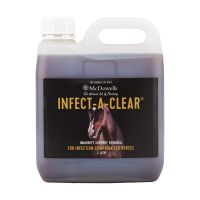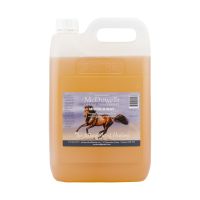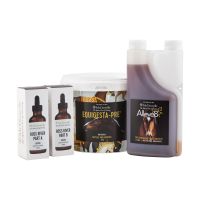It’s summer!!! The season for outdoor fun and adventure- along with disease-carrying mosquitoes!
Horses are large targets for mosquitoes and their thin light coats do not create a significant enough barrier to these pesky and persistent insects.
Arboviral diseases are diseases that are spread by biting insects such as mosquitoes. Mosquito bites are associated with alphavirus, Ross River Virus and flavivirus infection as well as West Nile Virus.
Did you know that Horses’ massive lungs expel large amounts of CO2 which attracts mosquitoes increasing the risk of an Arboviral infection?
With horses lacking countermeasures for protection from mosquitos, it is up to us to ensure that your horse is safe from succumbing to these serious conditions.
Arboviral Diseases
Infection in horses will not always result in clinical disease, however, horses may still present with symptoms such as staggering, ataxia, weakness, and depression.
It is important to be aware of the signs to ensure that these conditions are diagnosed and treated early to reduce the risk of serious complications.
West Nile Virus
West Nile Virus is a mosquito-borne virus that is known to have only affected horses in Australia, although there have been several suspected but not confirmed cases in dogs. Horses that develop the virus may not develop any clinical signs, and the early stages of the disease can be mistaken for colic. Initially, horses may appear depressed and reluctant to move but then can develop more neurological signs such as stumbling, staggering, hind limb weakness, confusion, and incoordination. Horses may also experience limb and facial paralysis.
If West Nile Virus is suspected, it is crucial to seek a diagnosis through a blood test, and if the results are positive, inform the appropriate authorities.
Although there is no known cure, supportive herbal programs can be provided and prevention to protect your horse is paramount.
Ross River Virus
Ross River Virus affects both humans and horses, with symptoms presenting similarly across both species, inclusive of fever, reduced appetite, muscular soreness, reluctance to move, a cough and sometimes swollen joints and glands. A horse may also experience a temperature that dramatically waxes and wanes for no reason, and experience respiratory and nervous signs.
Ross River Virus has similar signs to Hendra, so it is important to ensure an appropriate differential diagnosis.
Ross River Fever can have significant long-term effects on a horse if it is not seen to in a timely fashion, such as the development of ancillary diseases such as brain or spinal lesions. The virus can also reoccur in a horse due to stressful conditions.
Preventative action
There are several steps that you can take to limit your horse’s exposure to mosquitos and thus the risk of contracting an arboviral disease.
Stabling your horse with a protective flyscreen during peak mosquito times, such as dusk and dawn, can limit your horse’s exposure to mosquitoes and significantly reduce the risk. Covering your horse with light rugs and fly masks during peak periods, especially if stabling is not an option, can also be an effective preventative.
Clearing low-lying water and limiting a horse’s exposure to stagnant water sources where possible, will also reduce the exposure to the mosquito's highly frequented environments.
The use of natural insect replants can work as a short-term solution, whilst planting herbs and insect-repellent plants around the horse’s environment can have a lasting long-term benefit.
McDowells Herbal Products
Midge-A-Way
The Midge-away formula was developed in response to those seeking a 100% natural NON-TOXIC solution to dealing with flying insects, such as mosquitoes, along with midges. The product acts by using traditional anti-parasitic herbs in a base of raw cider vinegar and Methylated spirits, blended with 1:1 extracts and essential oils. The product is exceedingly safe to use, non-toxic, and when used correctly, helps to discourage insects from landing on your horse. The product can also be used as an environment spray.
Infect-A-Clear for horses
The herbs in this mix have been traditionally used to stimulate the horse’s own natural elimination which may help to clear these naturally occurring metabolites thereby improving the immune system's response.
Ross River Fever Program
Our Ross River Program consists of four products to be used together to enhance the body's natural healing mechanisms. The herbs in the formulas are traditionally used to stimulate the expulsion of infection and viral matter. The program is designed to build gut health, reduce pain and inflammation, along with stimulating elimination via normal metabolic processes and building a stronger immune system.




